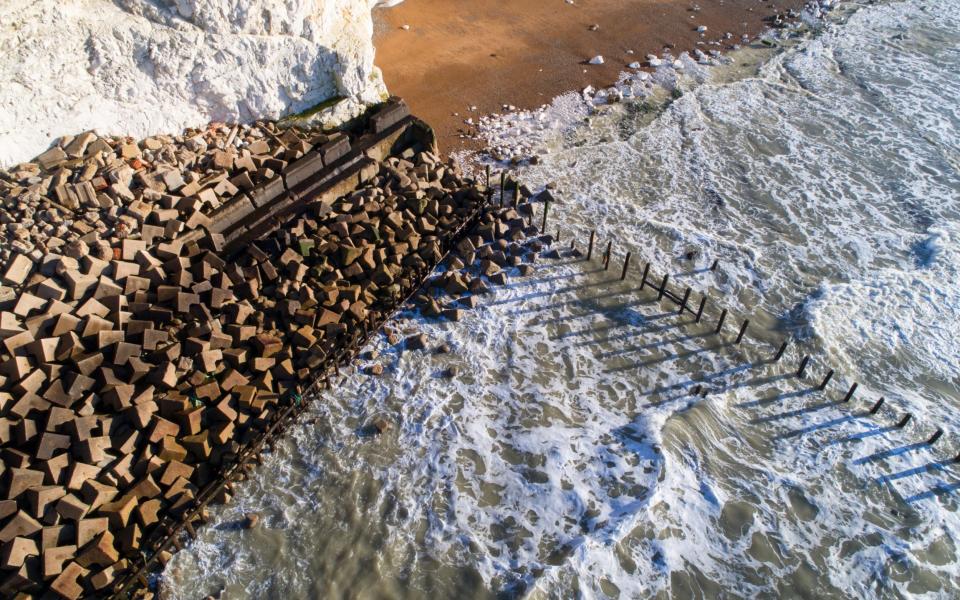Letters: The Elgin Marbles can never go back to the Parthenon, so they should stay in Britain

SIR – The Acropolis Museum in Athens already displays excellent replicas of the Elgin Marbles (Letters, November 30), along with originals from other parts of the frieze. For conservation reasons, none remain on the Parthenon itself and there can be no possibility of returning them there. It’s just an argument about which museum should house the originals, and which the replicas. Why change present arrangements?
Andrew Orange
Andover, Hampshire
SIR – In 1912 Lord Curzon of Kedleston intervened in the export of three 15th-century fireplaces, about to be shipped to America, and returned them to their home at Tattershall Castle in Lincolnshire.
American museums are awash with foreign art, much of it British, much of it acquired at knockdown prices from cash-strapped families.
Will those campaigning for the Elgin Marbles to be sent back to Athens follow Curzon’s example and champion our own lost treasures by giving equal energy to the return of British art and artefacts sold abroad?
Alexander Gordon
Llanyblodwel, Shropshire
SIR – The latest round of demands for the return of the Elgin Marbles merely demonstrates a wilful ignorance of the facts that placed them in the hands of the British Museum in the first place.
The 7th Earl of Elgin bought them from Turkish officials at the Parthenon (then an armoury of the Ottoman armed forces), who were helpless to stop local Greeks stealing fallen parts of the frieze for breaking up into wall stone or grinding down for lime.
That which would have been lost forever were it not for Elgin’s actions – however dubious – is free for the world to enjoy in the historical sanctuary of the British Museum. Greece has no right of return to a heritage it treated with such shameful contempt.
Mark Boyle
Johnstone, Renfrewshire
Covid concerns
SIR – It appears that the worst of politicians’, civil servants’ and spads’ backstabbing is on display at the Covid inquiry (Letters, December 1). There has been no thought on how the pandemic started or on how to prevent the next one, which, given all the bad actors out there now, and those who would do us harm, is very possible. It is highly likely to be man-made (given the lack of regulation of synthetic biology), highly virulent and capable of killing millions of people.
The only concern at the inquiry seems to be to pass the buck, which makes it – overall – a complete waste of money and time. We should be working out how to prevent the next major pandemic, rather than trying to apportion blame for the last
Colonel Hamish de Bretton-Gordon
Former commander UK and Nato chemical and biological defence forces
Tisbury, Wiltshire
NHS staffing
SIR– Poor health compelled me to spend much time this year in hospital, where I was fortunate to be given care by surgeons, doctors and nurses, almost every one of whom was an immigrant. They were uniformly skilled, caring and delightful, and I am intensely grateful to them all. But I cannot help reflecting that if the National Health Service can only be staffed from abroad, it must be as a result of a serious failure in our social policies.
This is not just a failure of government; it points to the fact that our own people have lost the will to serve – or even to work. The latest figures for those claiming sickness benefits, in particular, are quite unbelievable.
It was very much otherwise in the 19th century, when Australia, Canada and New Zealand received streams of British migrants who were prepared, even eager, to face the rigours of a pioneering life as preferable to unemployment in Britain. But then those hardy souls probably suffered from the deluded mindset that used to be known as the Protestant work ethic.
Michael St John Parker
Bampton, Oxfordshire
SIR – Might I suggest that comparing the UK’s immigrant population – and the socio-economic need for it – with that of Canada and Australia, as Robert Miller does (Letters, November 26), is simplistic in the extreme.
Australia has a population of 25.7 million and a land mass of 7.78 million square kilometres; Canada has a population of 38.25 million and a land mass of 10 million square kilometres; while the UK has a population of 67 million, across just 245,000 square kilometres.
His comments regarding the decline of health and educational services in Britain are of great concern, but addressing them simply by importing more lower-paid immigrant labour is not the answer. We need to get some of the near 1.6 million UK citizens on out-of-work benefits back into the labour market, and we need to be training more home-grown talent. We particularly need to train more in the medical profession, but we should require them to work in this country for a number of years after their studies in order to repay the cost of training, rather than allowing them to migrate to countries such as Australia immediately after qualifying, simply because the pay is better.
Andrew Ash
Market Harborough, Leicestershire
SIR – The assumption that putting in longer hours makes one a hard worker and consequently more productive is flawed (Letters, November 26). Numerous studies have shown that performance reduces sharply when people put in too many hours at work.
A far more productive working environment is created when – wherever feasible – flexible working arrangements allow staff to operate at times of their own peak efficiency.
Stuart Harrington
Burnham-on-Sea, Somerset
SIR – I was a prison officer for 27 years and wish to point out that not every civil servant has the option to work from home (Letters, November 26).
Prisons have been understaffed for many years, and officers have received pathetic, below-inflation pay rises, with 2023 being the exception. They do a job that many would never consider doing themselves and is independently held to be one of the most dangerous and stressful. Their work conditions have been eroded and their pension schemes devalued. They don’t have the right to strike, have an ineffectual union and have had to deal with a string of prison ministers who never solved any of the problems.
Francis Tindale
Wisbech, Cambridgeshire
Pavement parking
SIR – Your report (November 26) on parking on pavements echoes my own frustration. I walk daily to collect my copy of the Telegraph, and see many examples of cars parked with two wheels on the pavement, often blocking its use by pedestrians. A significant number of these are pushing buggies, some two abreast, and have to take to the road to get past the parked vehicle.
Perhaps the drivers think they are leaving the road clearer for other vehicles. Actually, however, they are causing great inconvenience and some danger to others. The sooner those that set the rules get on with enforcing them the better.
Nick Eckford
Harpenden, Hertfordshire
Our vulnerable east coast could be protected

SIR – You report (November 26) that a 650ft stretch of clifftop road has fallen into the sea at Hemsby in Norfolk.
Seaford in East Sussex lies protected behind a giant shingle bank, which is our sea wall. In the 1980s this was reinforced with huge granite boulders that were transported from Spain and covered with more shingle. Twice a year, a fleet of lorries moves the shingle from the east of the bay back to the west to reverse the longshore drift.
I accept that we are a town, not a village, but it can be done. I noted that large boulders at Hemsby were protecting the shoreline just up to the point where the road was washed away.
Unfortunately, governments of all parties have decided the east coast is not worthy of protection, encouraged by the eco-mob to let nature take its course. This needn’t be so, as both the Dutch and Seaford have proved. It is merely a question of priorities.
Michael Staples
Seaford, East Sussex
Foreign Office policy
SIR – The Foreign and Commonwealth Office’s reported ambivalence over Gaza (Leading Article, November 26) reminds me of being appointed to the Nato military headquarters in Belgium in 1989.
Knowing that a part of my portfolio was to be the accession of Spain to Nato under a series of coordination agreements, including one concerning Gibraltar, I arranged to call on the official in the FCO on the Gibraltar desk. I was obviously keen to know the FCO’s Gibraltar policy. I’ll never forget the response to my innocent inquiry: “My dear boy, we don’t have a policy over Gibraltar.”
Commodore Peter Melson RN (retd)
Droxford, Hampshire
RSPB bias
SIR – It is a pity that the Royal Society for the Protection of Birds can apparently no longer be relied on to give unbiased facts on our rarer birds. About the only way a hen harrier could have been decapitated (report, November 26) is by a wind turbine or hitting a pylon cable in a gale.
It did not mention that reported crimes against birds of prey have been dropping or that more young harriers were fledged in England than ever before – due not least to the owners of moors protecting them.
Lord Vinson
Alnwick, Northumberland
SIR– The killing of endangered species of birds of prey by gamekeepers is just one of the problems with the bird shooting industry. There is also the use of cruel and oppressive metal battery cages, in which are kept thousands of pheasants and partridges, used for egg production. They are so stressed they can wound each other and may also harm themselves in their desperation to escape. On grouse-shooting estates, there is evidence of moors being burnt to create heather to feed the birds that are to be shot. This degrades the carbon-rich peat, releasing climate-damaging carbon dioxide.
Shooting is not about taking food from the wild, as most of the shot birds do not end up being eaten. It is a blood sport and takes place for profit and for the entertainment of the shooters.
Iain Green
Director, Animal Aid
Tonbridge, Kent
Monty’s support
SIR – I agree with Phil Page (Letters, November 26) that we see too many gardens in Gardeners’ World and do not get enough useful tips and information.
I shall miss Monty Don if he retires, but, before he goes, I think it would only be fair for him to let us know – or even see – the number of staff he has to maintain his vast garden, and also to know what Mrs Don does with the huge amount of fruit and vegetables he produces.
Jenny Funge-Smith
East Hagbourne, Oxfordshire
SIR – I very much agree with Phil Page that Beechgrove from BBC Scotland is now a better gardening programme than Gardeners’ World. Its format and presenters are excellent. However, unlike Mr Page, I do like seeing other people’s gardens.
Another programme from BBC Scotland is Landward; it is the perfect antidote to the increasingly woke and climate-obsessed Countryfile, and you could not have a better presenter than Dougie Vipond.
Philip Roberts
Caernarfon
Musical service
SIR – The organist at our Methodist church has just completed his 45th year playing for us. Not so remarkable perhaps, until you add that his predecessor was our organist for 60 years, going all the way back to the year 1918.
I doubt any church had fewer than two organists in that time, but I’d be interested to know if there is a church that can beat our total of 105 years served by just two people.
Amanda Hume
Birmingham
Letters to the Editor
We accept letters by email and post. Please include name, address, work and home telephone numbers.
ADDRESS: 111 Buckingham Palace Road, London, SW1W 0DT
EMAIL: dtletters@telegraph.co.uk
FOLLOW: Telegraph Letters on Twitter @LettersDesk
NEWSLETTER: sign up to receive Letters to the Editor here

